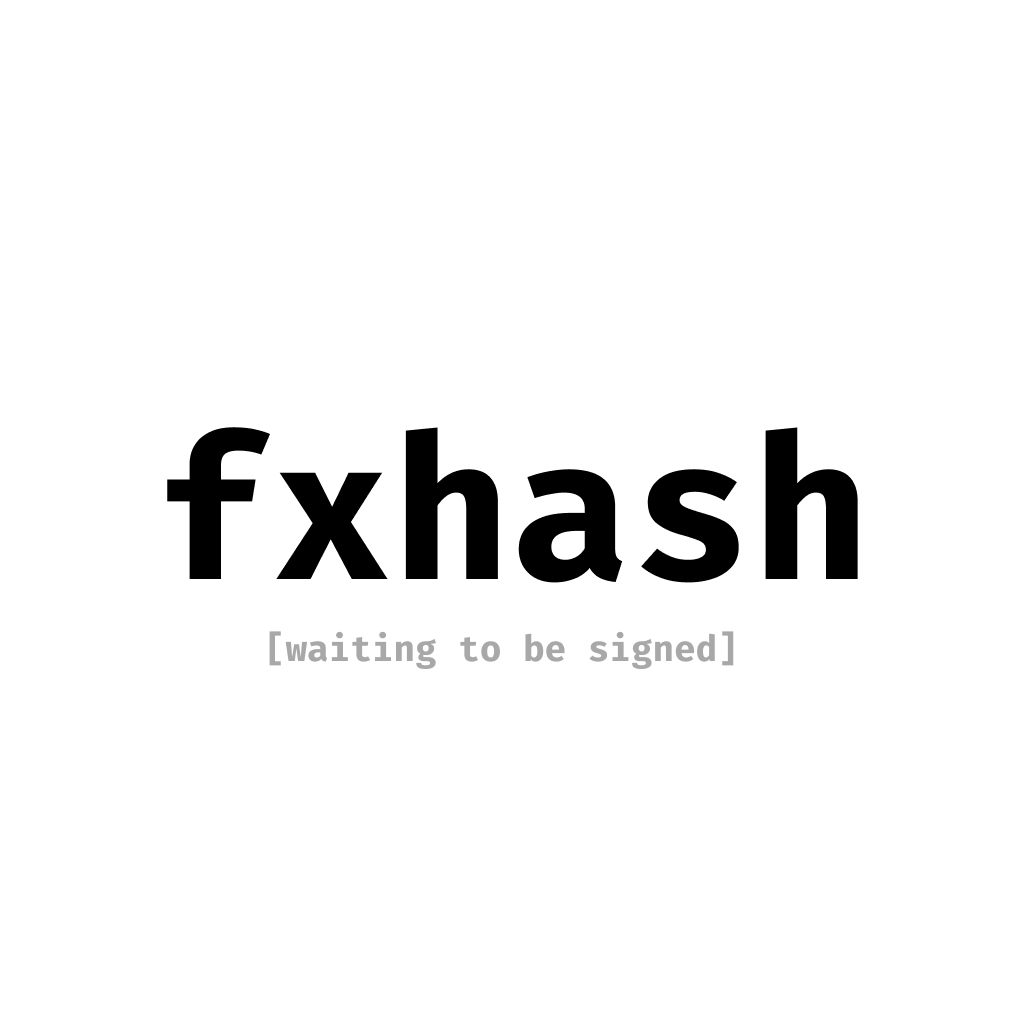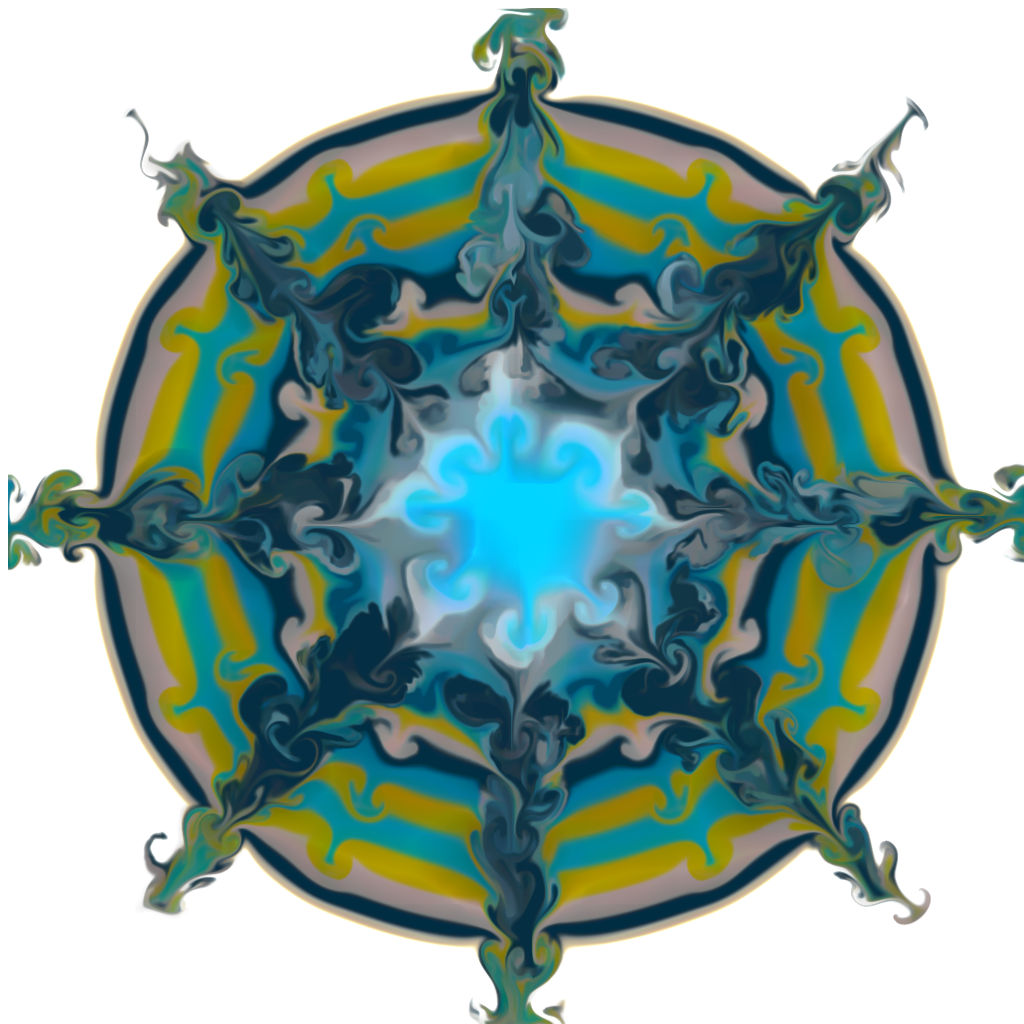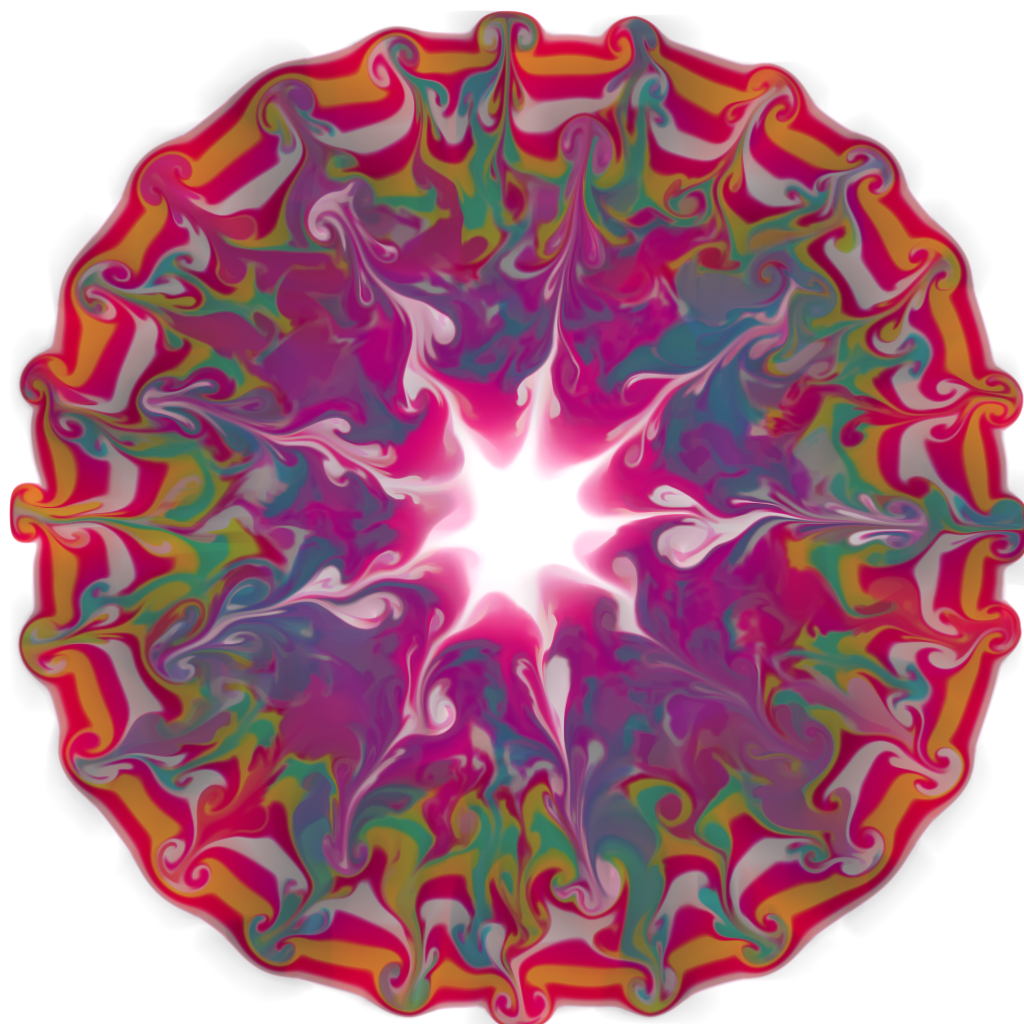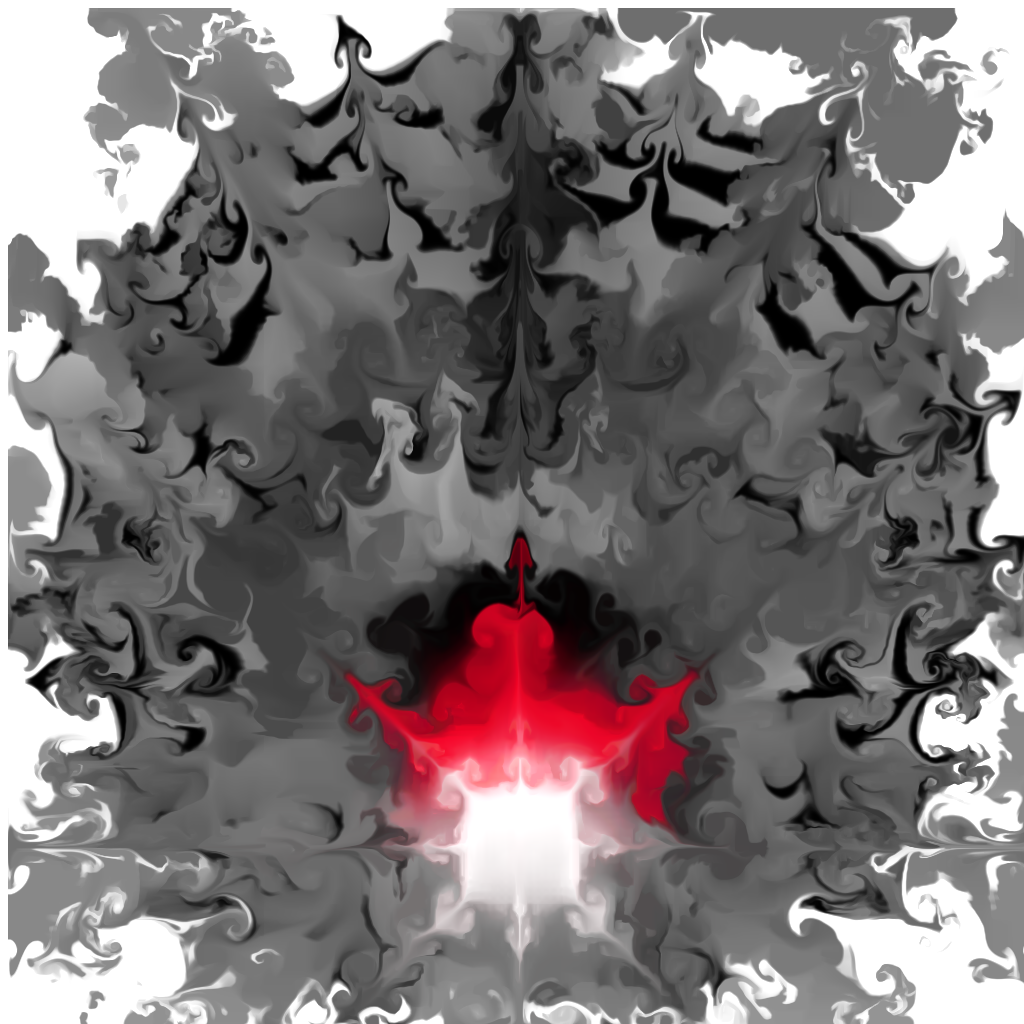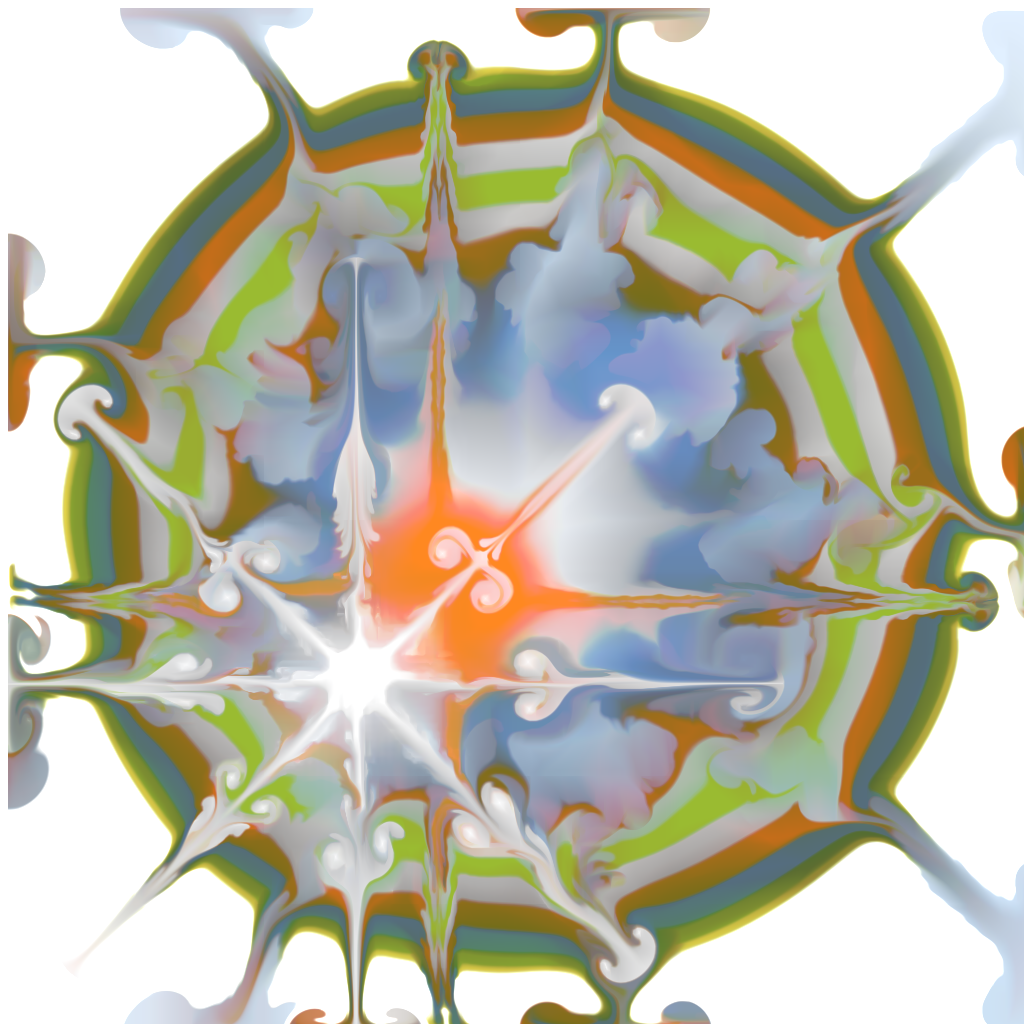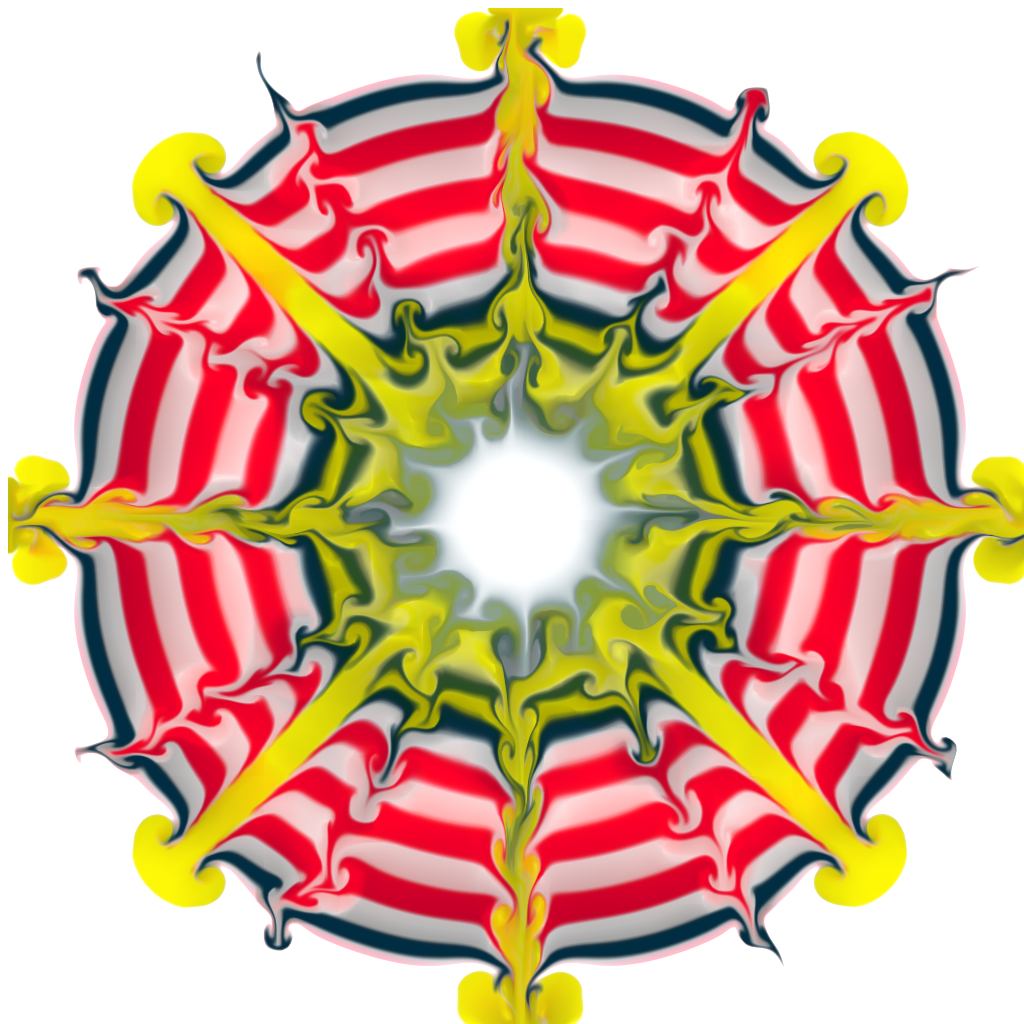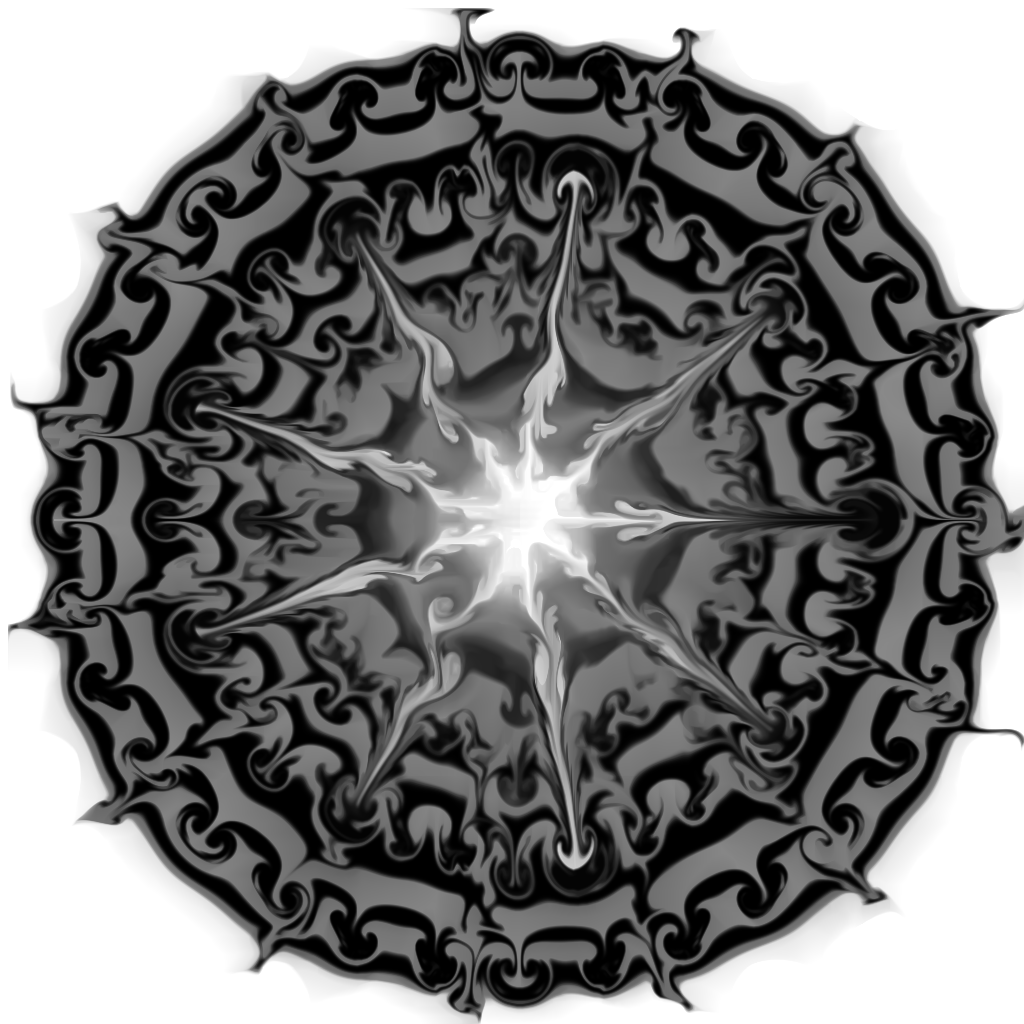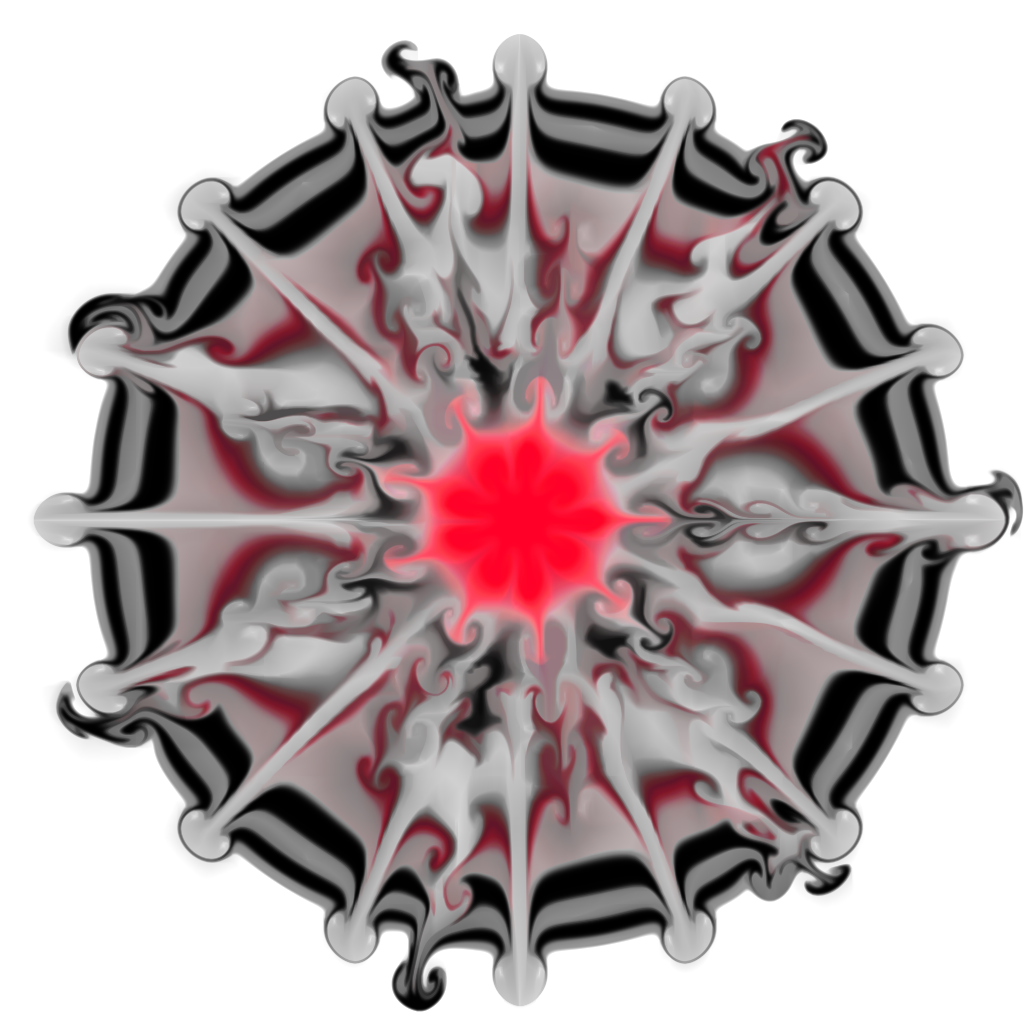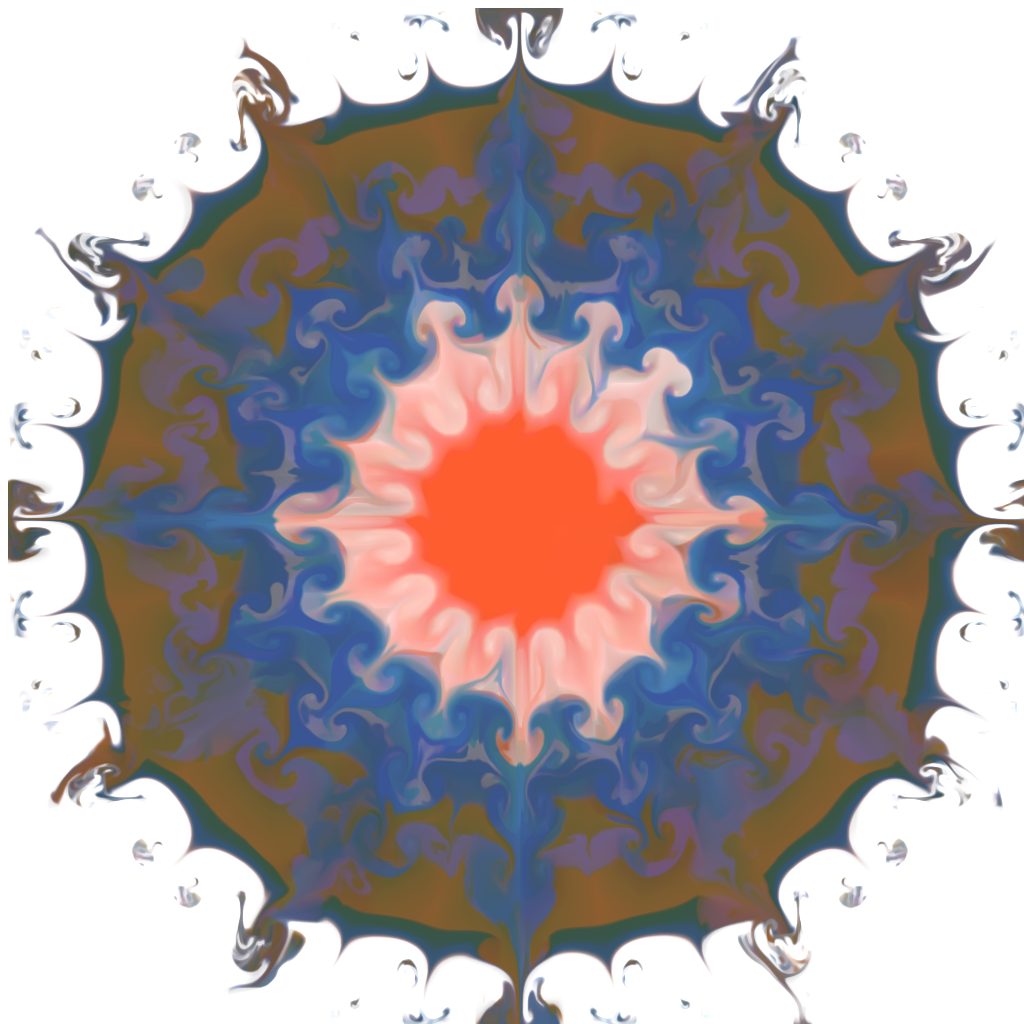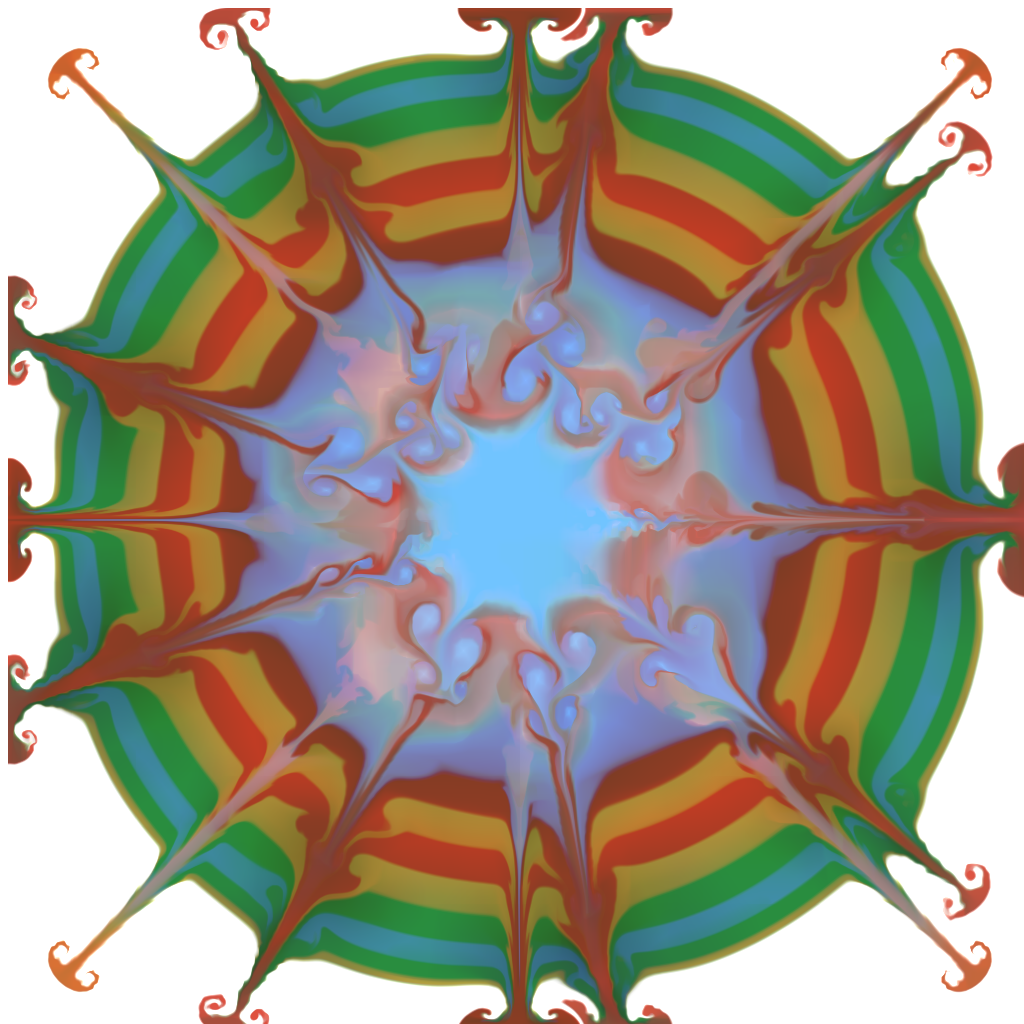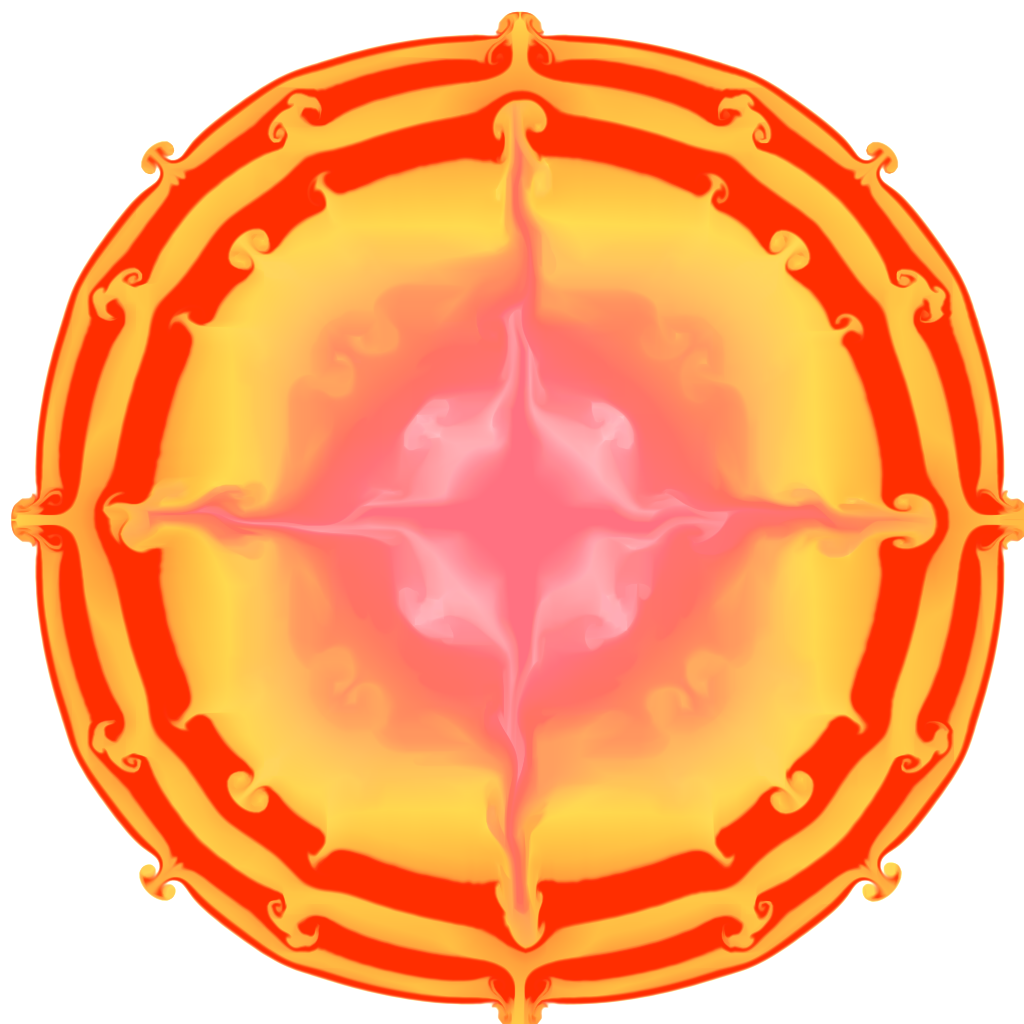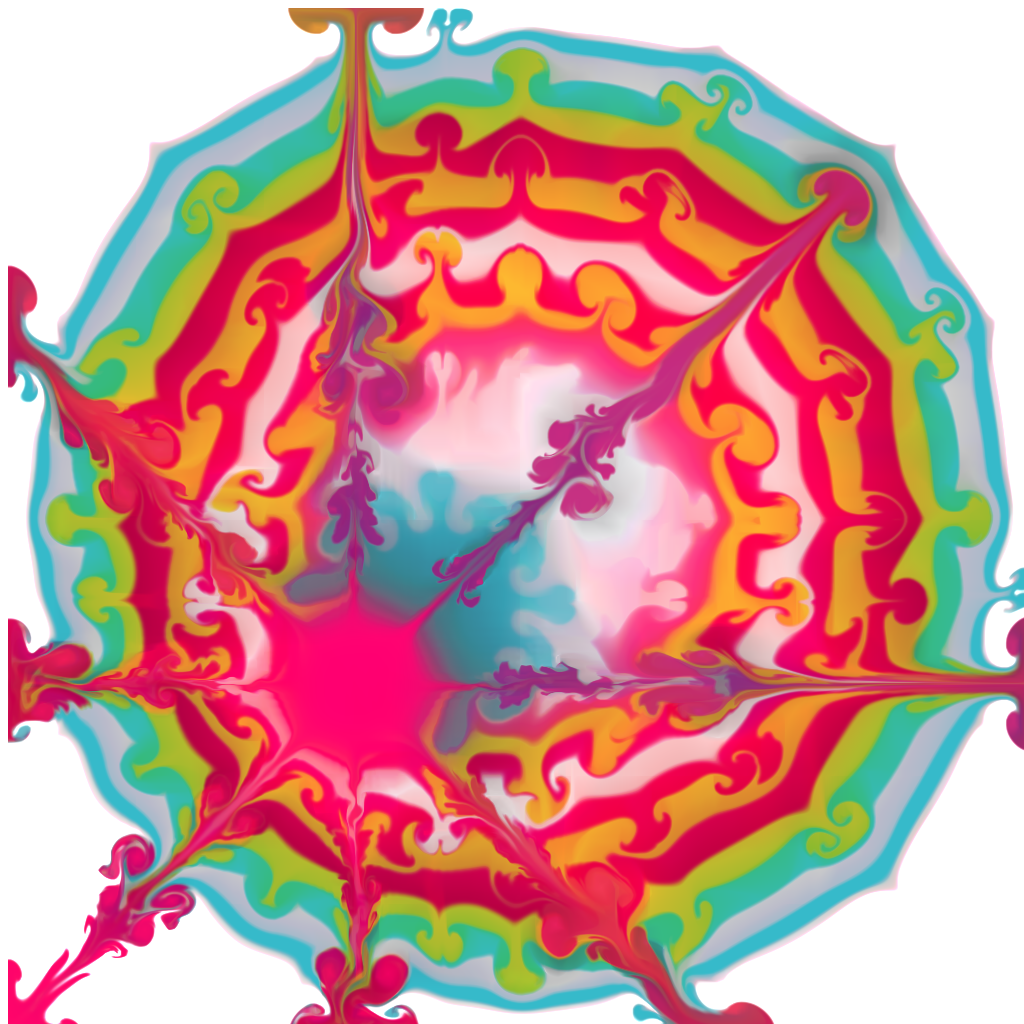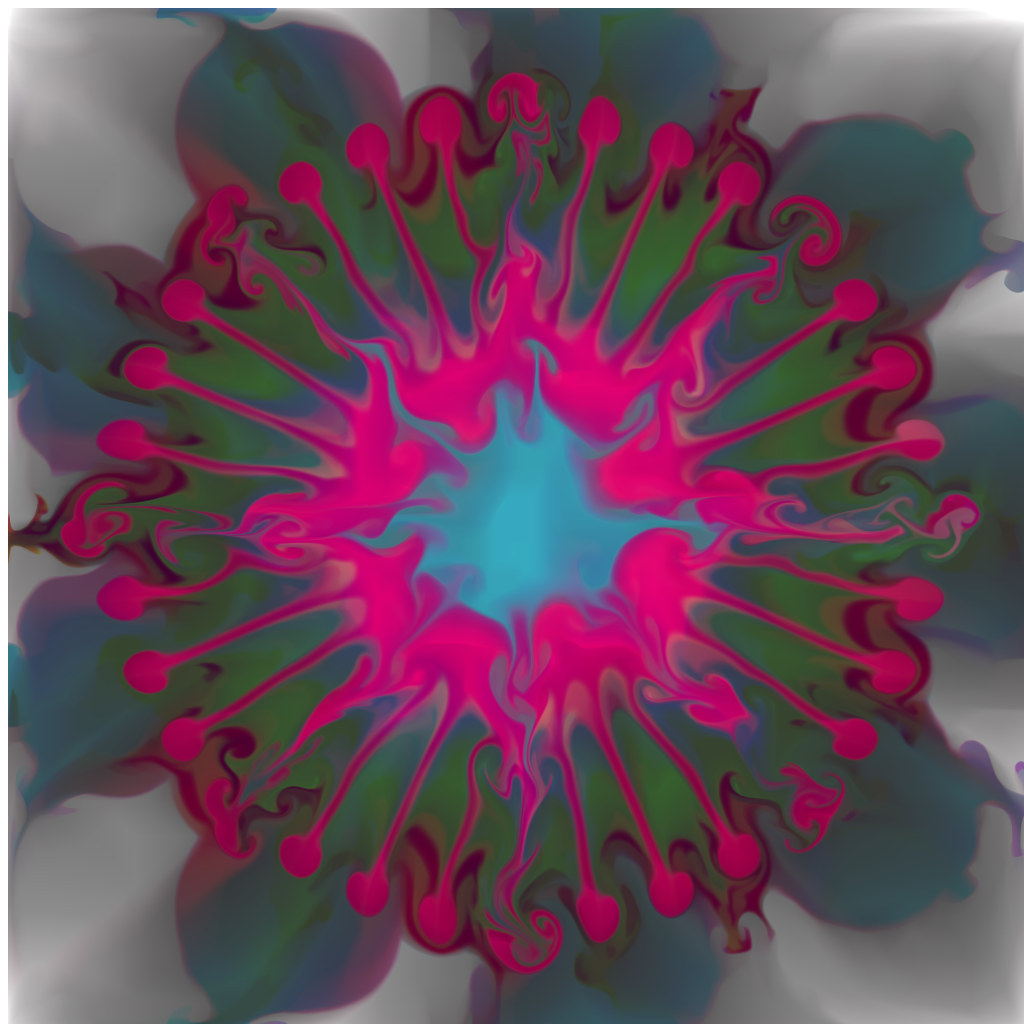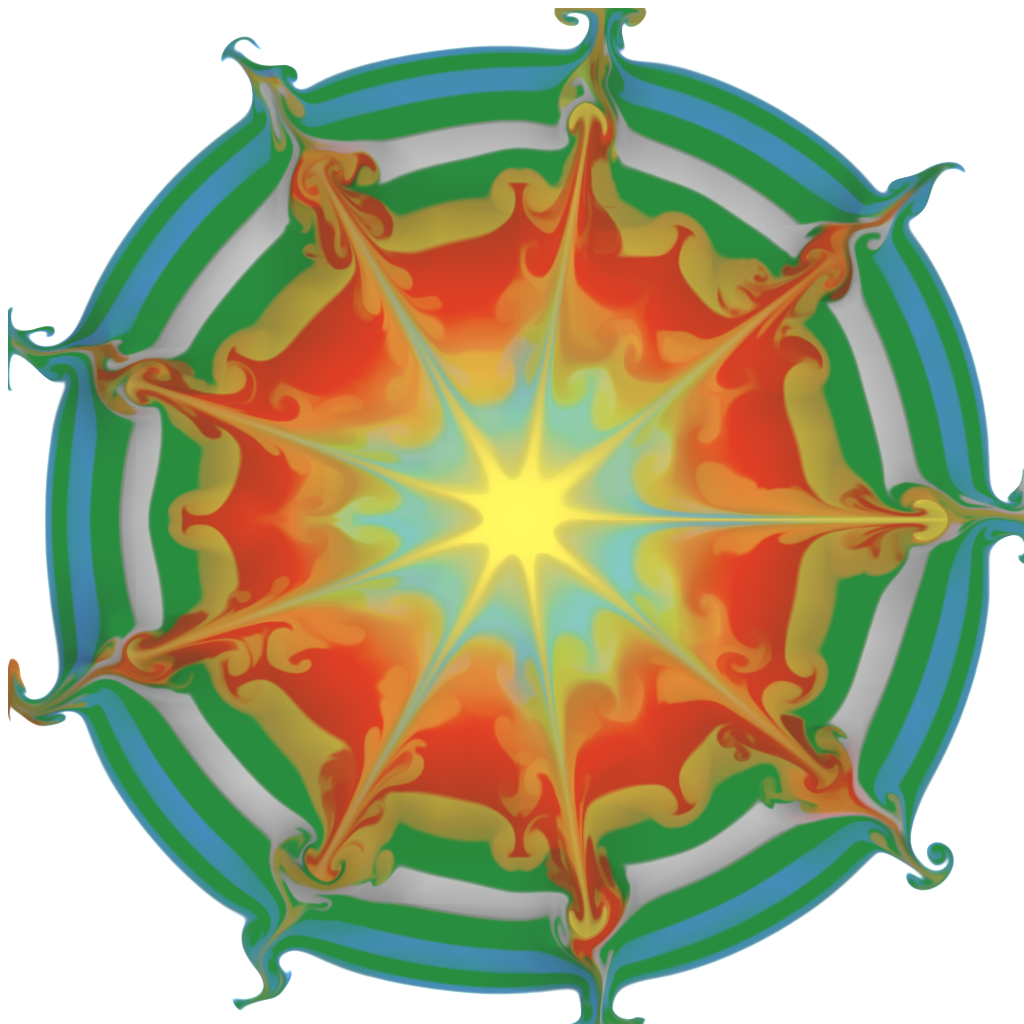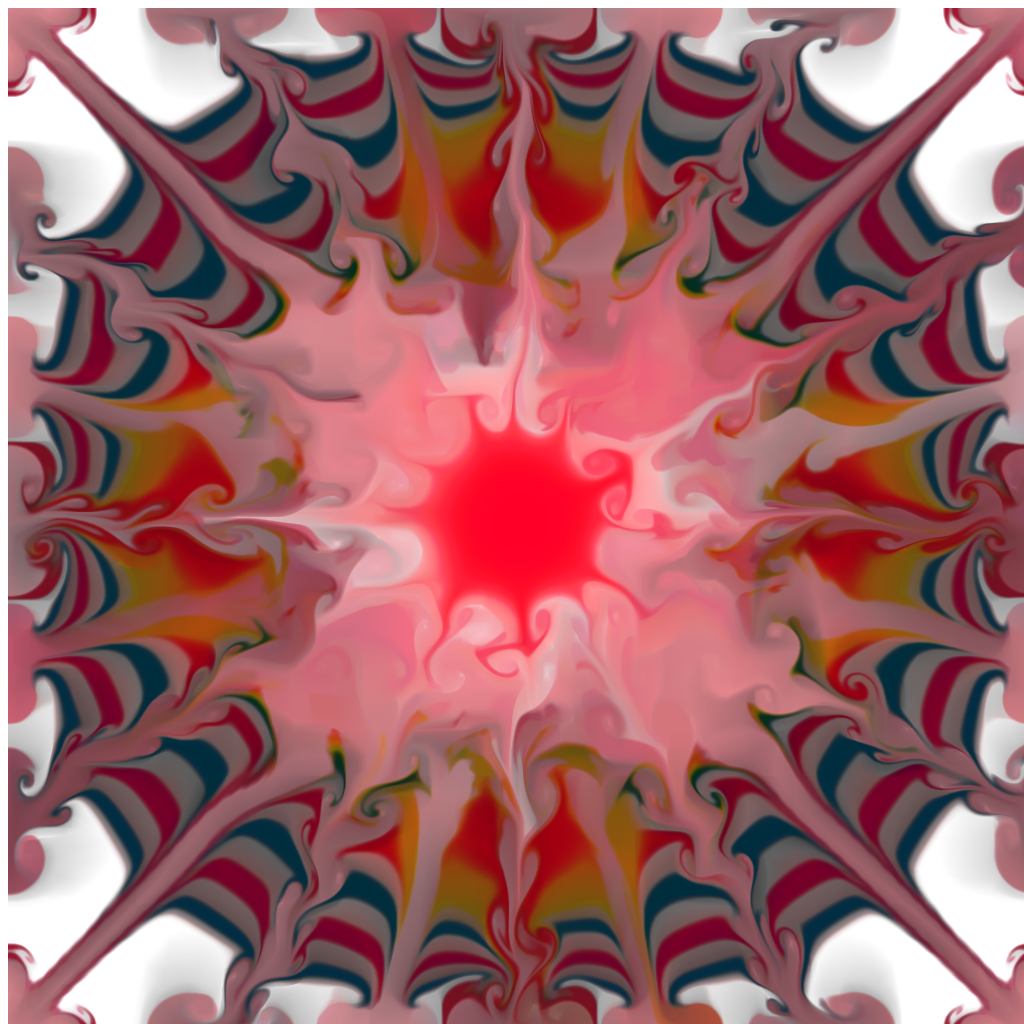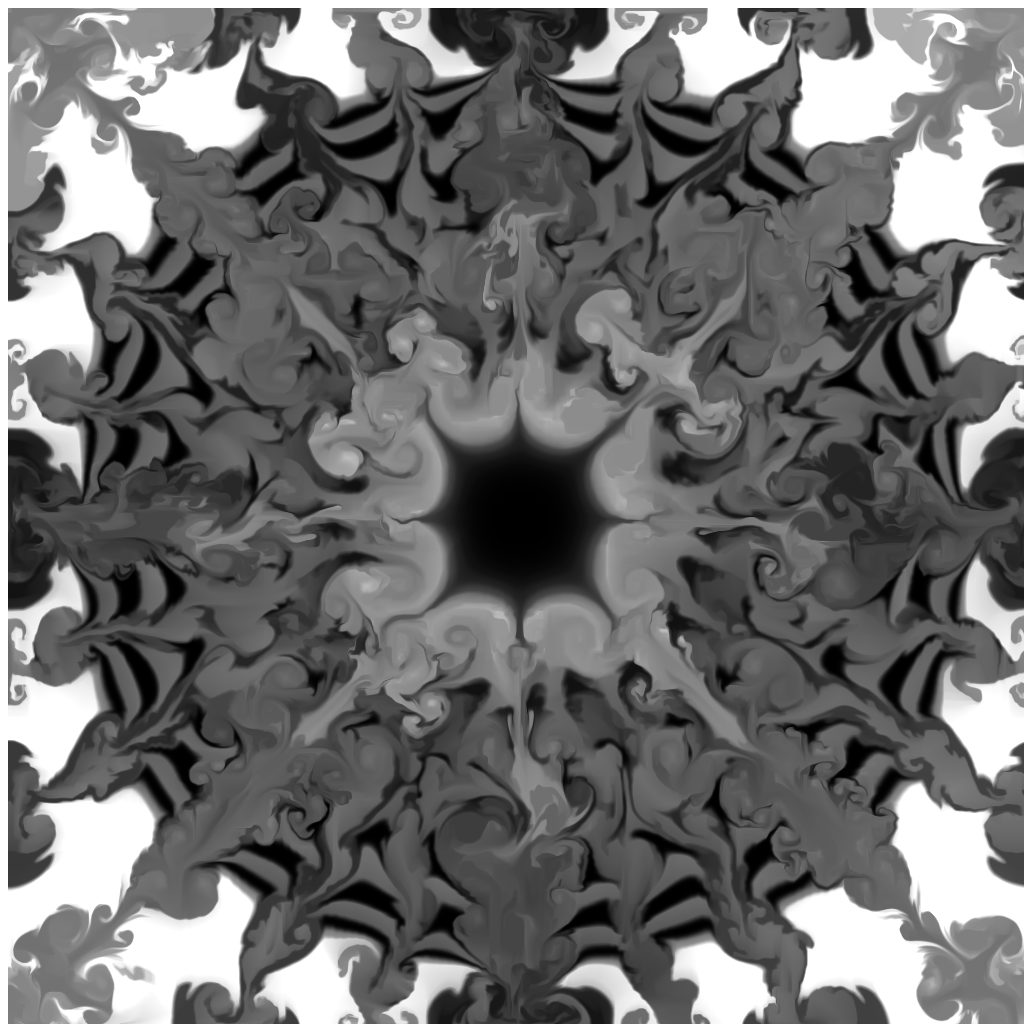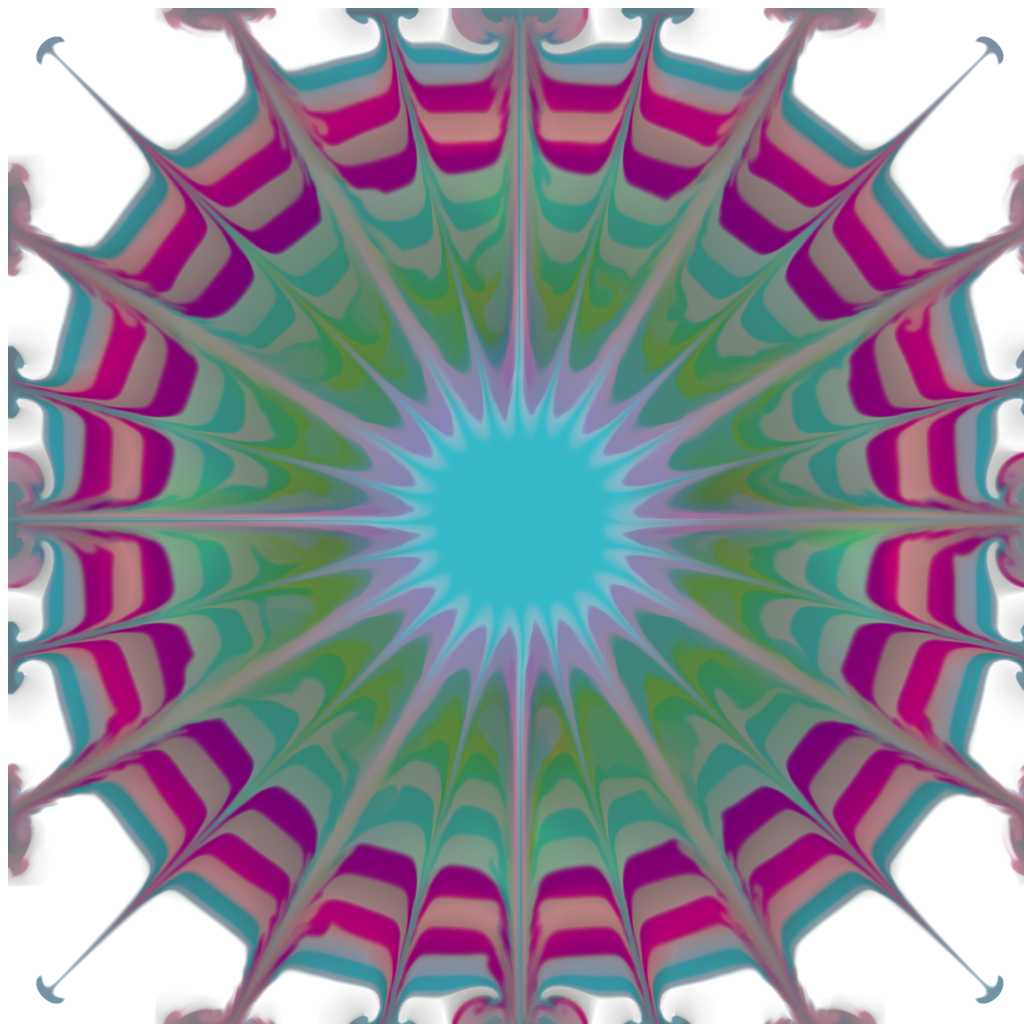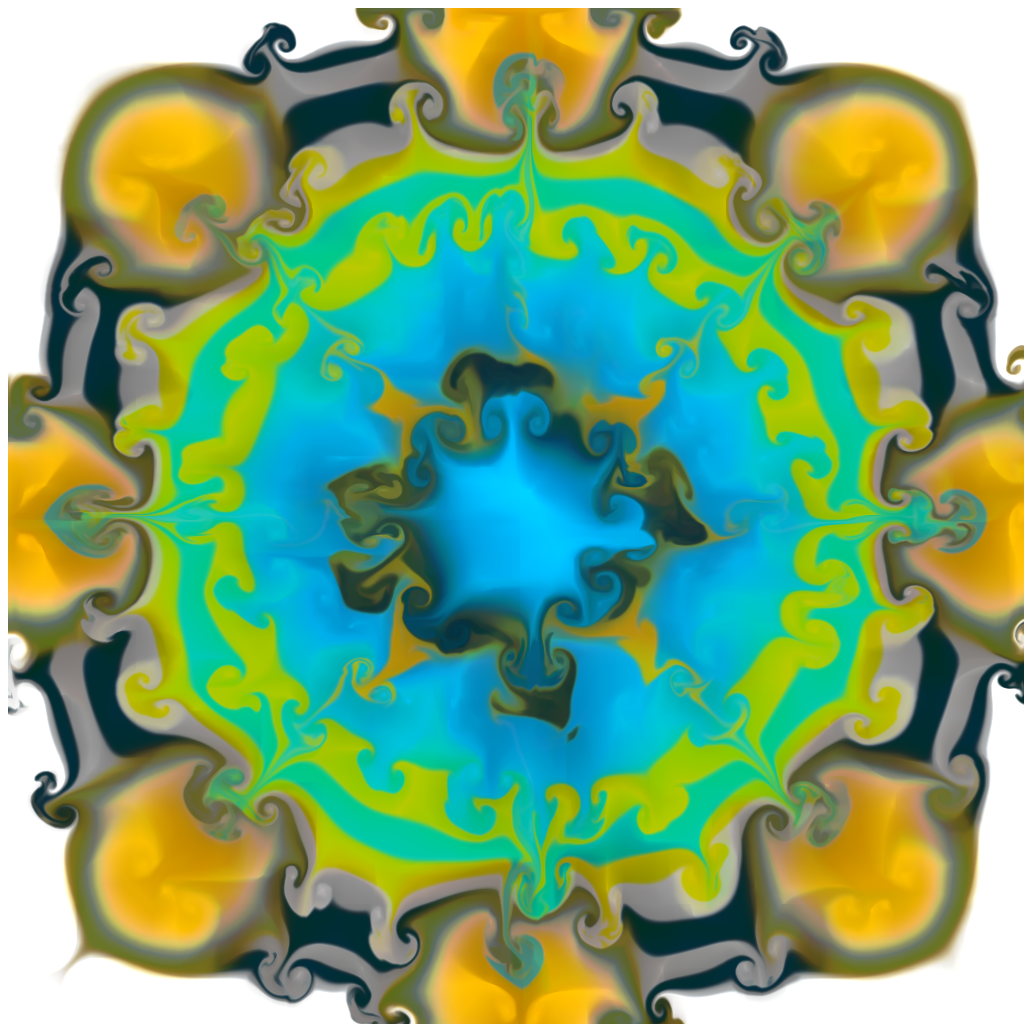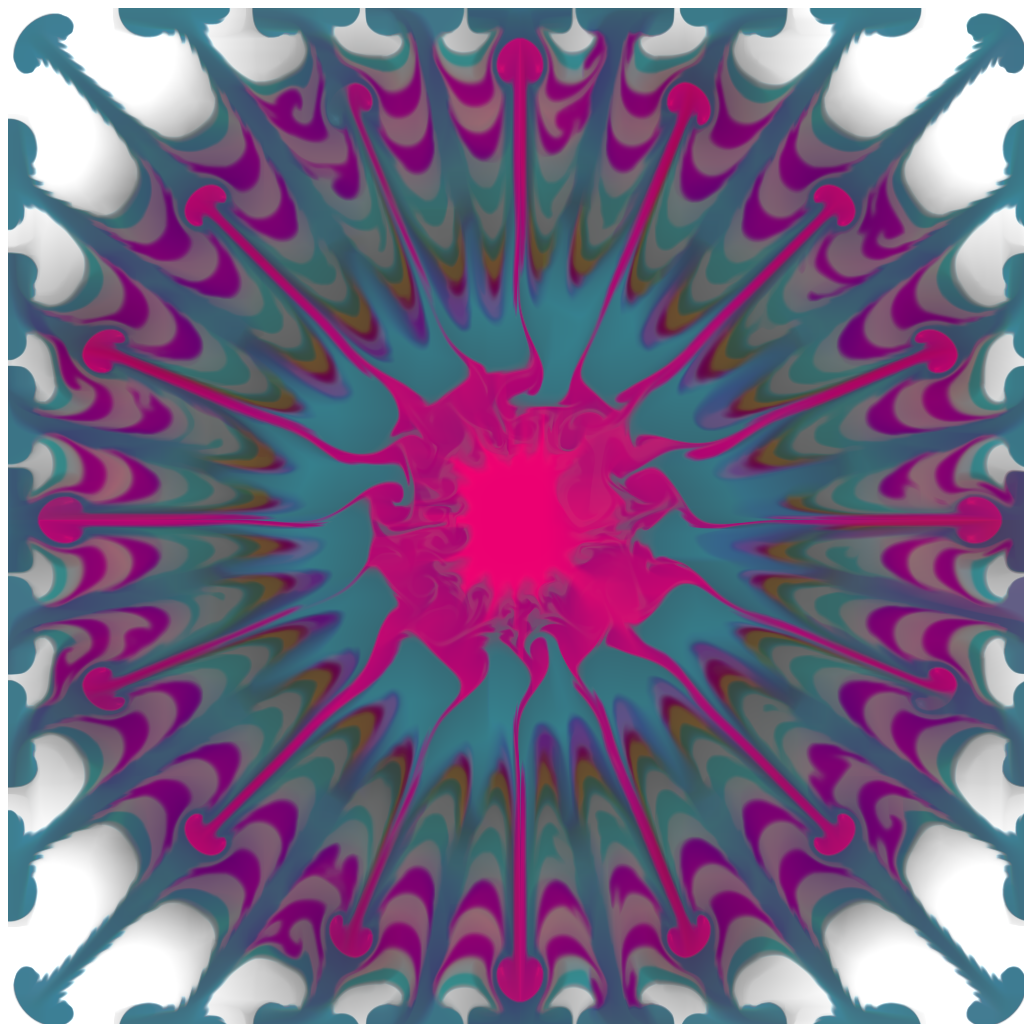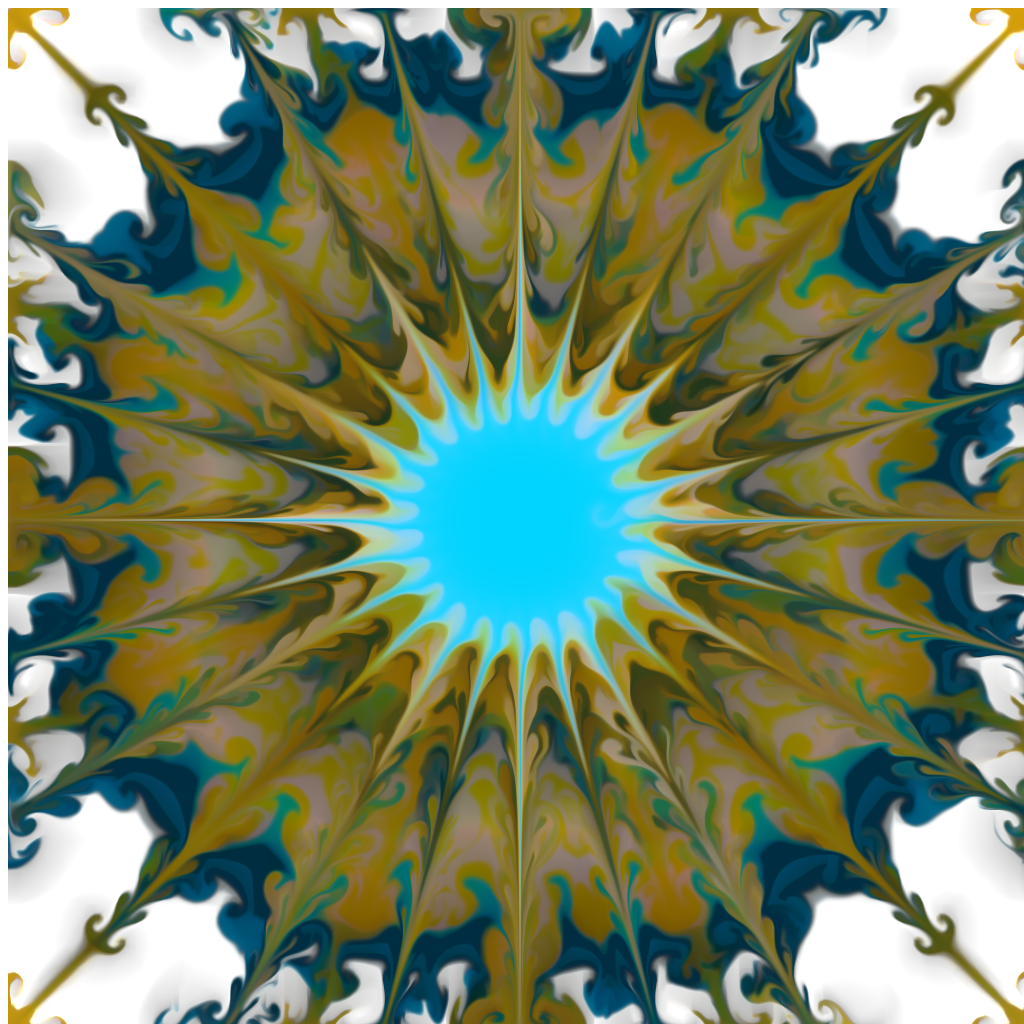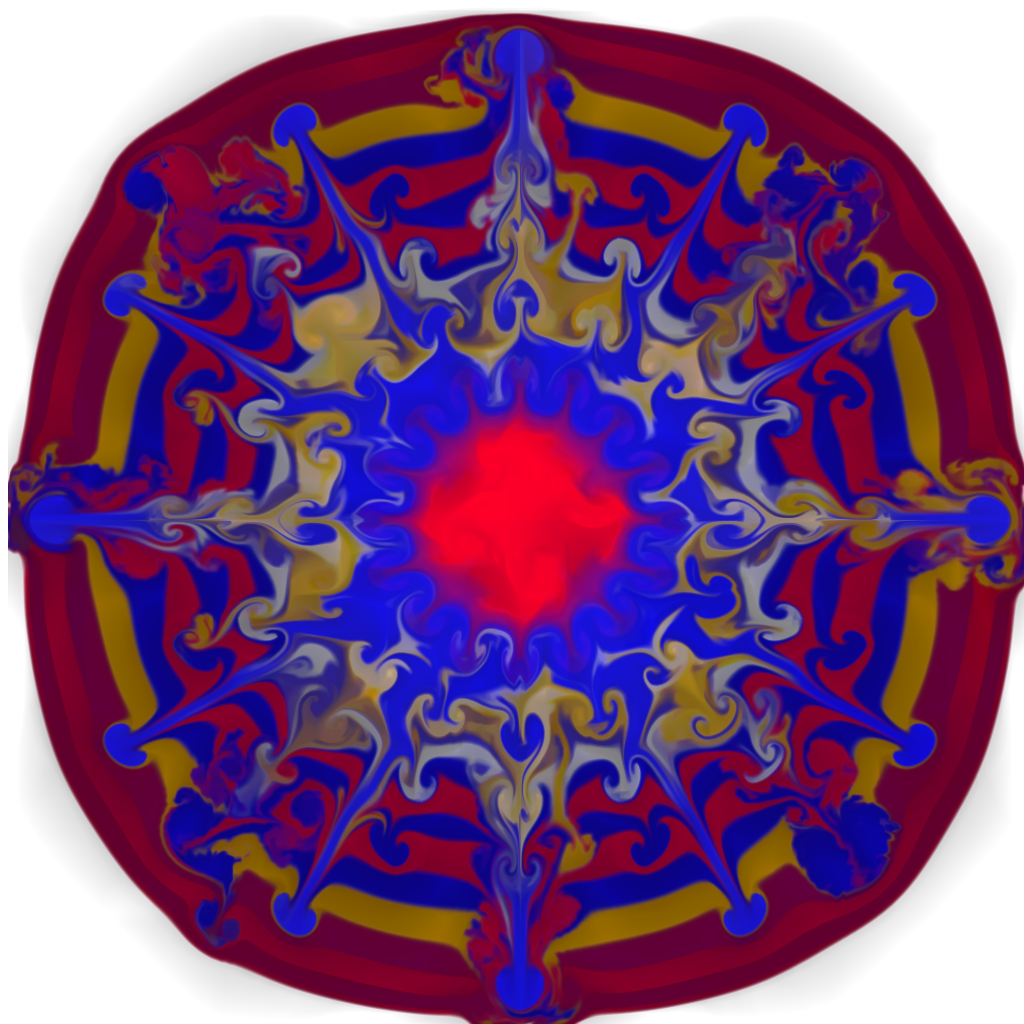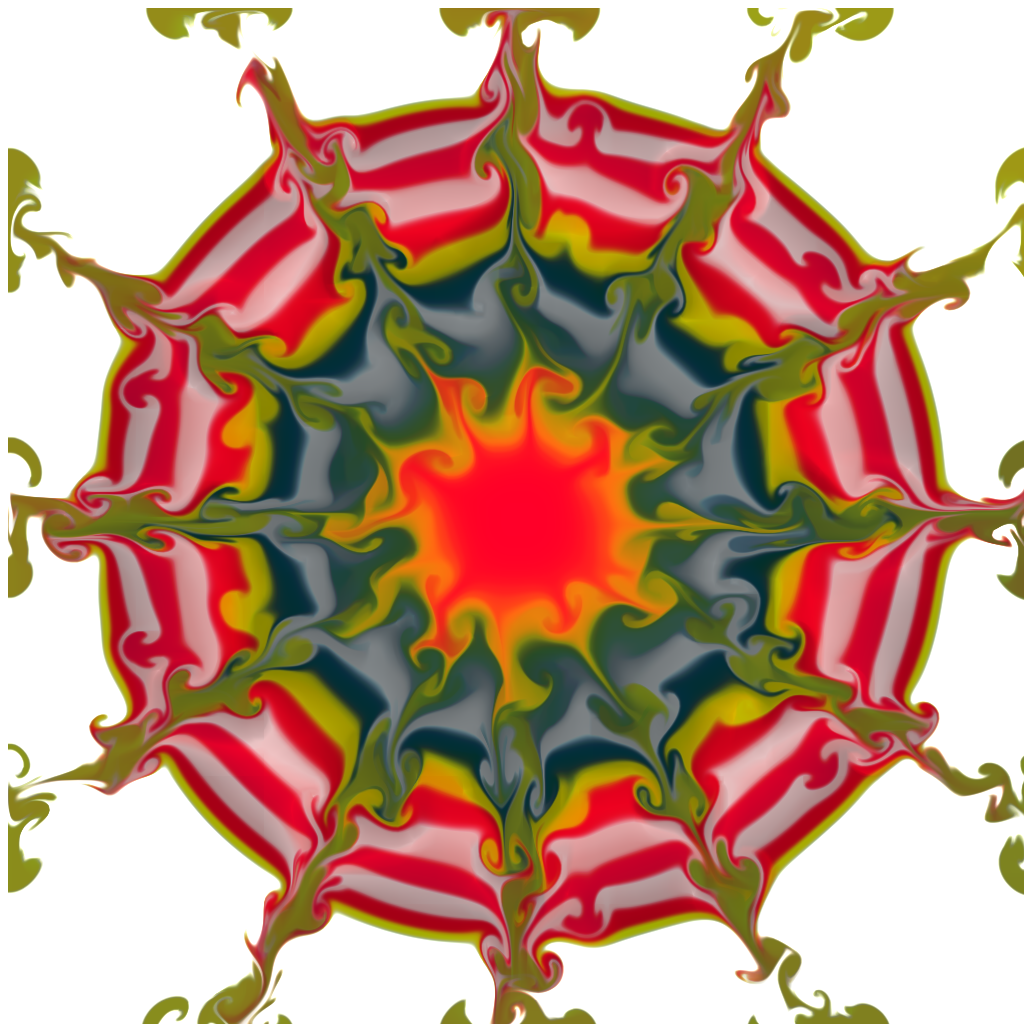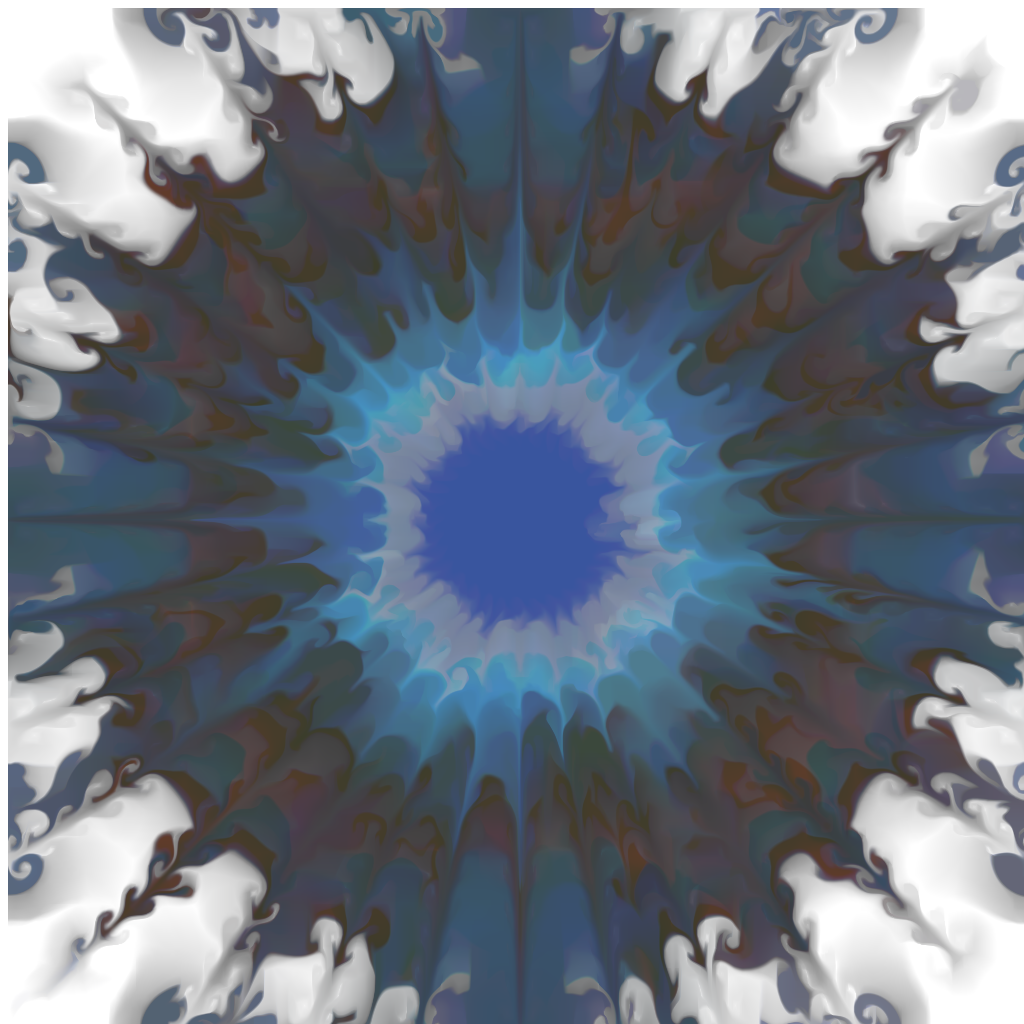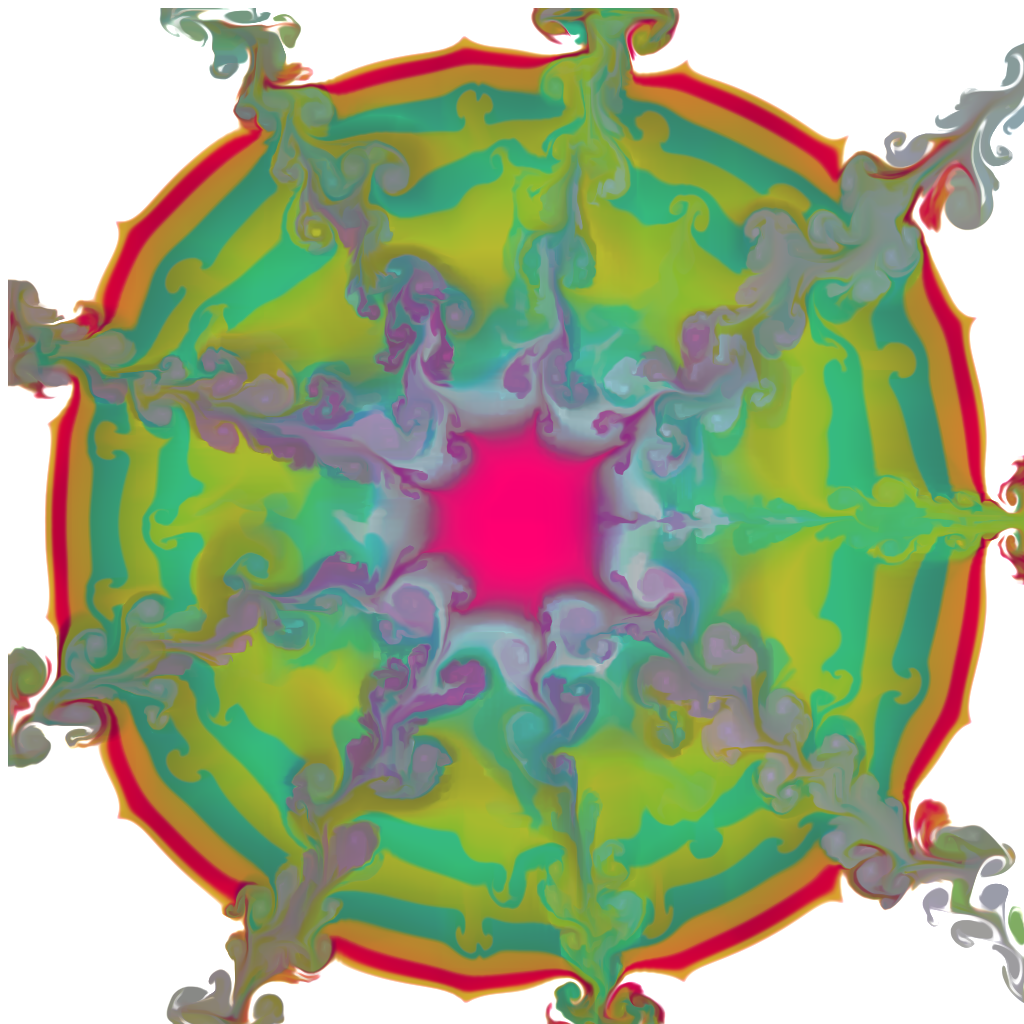by Naibdian
Viscous Circles
IPFS

20 January 2023•TEZOS•IPFS
Watch your computer perform "digital marbling" by dropping digital colored inks on digital liquid and shape it with its own little digital fingers and some not very honest laws of digital physics.
Viscous Circles is the first iteration on a brand new Wasm/Rust fluid simulation engine. I intend to produce other generators with the many other ideas for digital marbling. If you like it, don't hesitate to mint some tokens, it helps me finance my work as it requires lots of energy & time to mix both technical exploit and artistic creation.
Controls
You can stop at any step if you like the state at this instant, you can restart it, de/increase resolution (default is 4096x4096 to have sharp image, up to what your CPU/GPU can manage) and snapshot at any resolution.
- H: hide/show help.
- Space - pause/start animation.
- R - restart animation.
- I - hide/show res/fps panel.
- A-Q/D - down/up full resolution
- S - take full resolution snapshot
The story
I'm fascinated by the ancient art of "marbling", specially Turkish marbling (Ebrû), Japanese marbling (Suminagashi) but also Italian marbling from Florence and others from Persia, India, etc... Marbling's idea is so simple: drop ink droplets of different colors, viscosity, quantity in a liquid and let fluids interact following laws of nature. If they can't mix, they will repel each other create evocative shapes with respect to the strength when you drop it. Sometimes, they'll mix a bit creating new colors. Then you can shape by moving, pushing color particles with pencils, creating wind on the surface etc... Possibilities are infinite. At the end, you "print" the creation on a paper you put on the surface of liquid that will "drink" the ink. For examples, check Ertugrul Incel, a Turkish artist making amazing creations with fantastic color & compositions that can be minted on NFT platforms https://twitter.com/ErtugrulIncel.
Yet, what fascinates me in marbling is not only the result but the process of creation: I love watching marbling artists shaping their creations, it's like magic. You'll find plenty samples on youtube.
Thus, I wanted to build a unique generator inspired by those techniques and artists yet very humbly, not pretending to reproduce real-life marbling or artists. I want it to be "digital marbling" with its own behaviors, visuals, limitations. And the most important: I want it to offer the marbling performance made live to my minters. Finally, we are in computer world so we can simulate physics but we are also not constrained by it so we can change physics. Thus, you'll see behaviors that are impossible in real-life (specially about curls & vortices).
This generator is also the result of a long technical exploration. I've spent couple of months building a Webgl/WASM/Rust/JS engine approximating Navier-Stoke fluid mechanics equation on GPU (and CPU too), strongly relying on existing great implementations https://github.com/PavelDoGreat/WebGL-Fluid-Simulation and https://shahriyarshahrabi.medium.com/gentle-introduction-to-fluid-simulation-for-programmers-and-technical-artists-7c0045c40bac themselves reproducing other works, specially those from Nvidia people. The rest of the work is my own touch to make it behave as I want first and then make the generative magic happen by randomizing creation until it starts to surprise myself. And I'm really surprised.
Now, time to marble!
Viscous Circles @naibdian 2023 Project made using Opensource WebGL, WASM/Rust/JS libs
Viscous Circles is the first iteration on a brand new Wasm/Rust fluid simulation engine. I intend to produce other generators with the many other ideas for digital marbling. If you like it, don't hesitate to mint some tokens, it helps me finance my work as it requires lots of energy & time to mix both technical exploit and artistic creation.
Controls
You can stop at any step if you like the state at this instant, you can restart it, de/increase resolution (default is 4096x4096 to have sharp image, up to what your CPU/GPU can manage) and snapshot at any resolution.
- H: hide/show help.
- Space - pause/start animation.
- R - restart animation.
- I - hide/show res/fps panel.
- A-Q/D - down/up full resolution
- S - take full resolution snapshot
The story
I'm fascinated by the ancient art of "marbling", specially Turkish marbling (Ebrû), Japanese marbling (Suminagashi) but also Italian marbling from Florence and others from Persia, India, etc... Marbling's idea is so simple: drop ink droplets of different colors, viscosity, quantity in a liquid and let fluids interact following laws of nature. If they can't mix, they will repel each other create evocative shapes with respect to the strength when you drop it. Sometimes, they'll mix a bit creating new colors. Then you can shape by moving, pushing color particles with pencils, creating wind on the surface etc... Possibilities are infinite. At the end, you "print" the creation on a paper you put on the surface of liquid that will "drink" the ink. For examples, check Ertugrul Incel, a Turkish artist making amazing creations with fantastic color & compositions that can be minted on NFT platforms https://twitter.com/ErtugrulIncel.
Yet, what fascinates me in marbling is not only the result but the process of creation: I love watching marbling artists shaping their creations, it's like magic. You'll find plenty samples on youtube.
Thus, I wanted to build a unique generator inspired by those techniques and artists yet very humbly, not pretending to reproduce real-life marbling or artists. I want it to be "digital marbling" with its own behaviors, visuals, limitations. And the most important: I want it to offer the marbling performance made live to my minters. Finally, we are in computer world so we can simulate physics but we are also not constrained by it so we can change physics. Thus, you'll see behaviors that are impossible in real-life (specially about curls & vortices).
This generator is also the result of a long technical exploration. I've spent couple of months building a Webgl/WASM/Rust/JS engine approximating Navier-Stoke fluid mechanics equation on GPU (and CPU too), strongly relying on existing great implementations https://github.com/PavelDoGreat/WebGL-Fluid-Simulation and https://shahriyarshahrabi.medium.com/gentle-introduction-to-fluid-simulation-for-programmers-and-technical-artists-7c0045c40bac themselves reproducing other works, specially those from Nvidia people. The rest of the work is my own touch to make it behave as I want first and then make the generative magic happen by randomizing creation until it starts to surprise myself. And I'm really surprised.
Now, time to marble!
Viscous Circles @naibdian 2023 Project made using Opensource WebGL, WASM/Rust/JS libs
100 EDITIONS
•0 RESERVES
minted
100 / 100
dutch auction
3 TEZ
Lorem ipsum project longer longer
0.00001 ETH
Lorem ipsum project longer longer
0.00001 ETH
Lorem ipsum project longer longer
0.00001 ETH
Lorem ipsum project longer longer
0.00001 ETH
Lorem ipsum project longer longer
0.00001 ETH
Lorem ipsum project longer longer
0.00001 ETH
Lorem ipsum project longer longer
0.00001 ETH
Lorem ipsum project longer longer
0.00001 ETH
Lorem ipsum project longer longer
0.00001 ETH
Lorem ipsum project longer longer
0.00001 ETH
Lorem ipsum project longer longer
0.00001 ETH
Lorem ipsum project longer longer
0.00001 ETH
Lorem ipsum project longer longer
0.00001 ETH
Lorem ipsum project longer longer
0.00001 ETH
Lorem ipsum project longer longer
0.00001 ETH
Lorem ipsum project longer longer
0.00001 ETH
Lorem ipsum project longer longer
0.00001 ETH
Lorem ipsum project longer longer
0.00001 ETH
Lorem ipsum project longer longer
0.00001 ETH
Lorem ipsum project longer longer
0.00001 ETH
Lorem ipsum project longer longer
0.00001 ETH
Lorem ipsum project longer longer
0.00001 ETH
Lorem ipsum project longer longer
0.00001 ETH
Lorem ipsum project longer longer
0.00001 ETH
